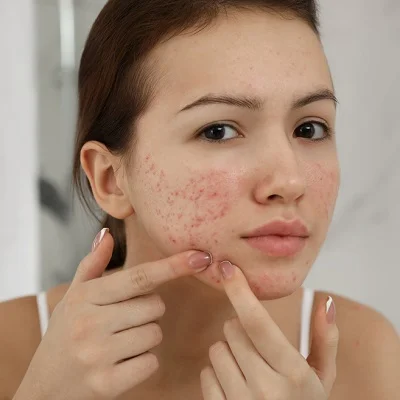Acne treatments in Dubai, like in other parts of the world, come in a variety of forms. While many of these treatments are effective, others may not be suitable for everyone. Here’s a guide to what works and what to avoid when seeking Acne Treatment in Dubai.
What Works
- Laser Therapy
- Types: The most popular laser treatments for acne in Dubai include Fractional CO2 Laser and PicoSure Laser.
- Effectiveness: Lasers are effective at reducing acne scars, improving skin texture, and treating active acne. Fractional CO2 lasers target deeper layers of the skin to promote collagen production, while PicoSure is effective for post-acne scars and pigmentation.
- Considerations: Treatment is quick and minimally invasive, but you may need several sessions for optimal results.
- Chemical Peels
- Types: Salicylic acid, Glycolic acid, and TCA (Trichloroacetic Acid) peels are commonly used for acne in Dubai.
- Effectiveness: Chemical peels help exfoliate the skin, remove dead skin cells, and treat clogged pores, which are common causes of acne. They also work to reduce acne scarring and hyperpigmentation.
- Considerations: Chemical peels may cause mild redness or peeling after treatment. It’s important to avoid sun exposure post-treatment.
- Topical Treatments (Retinoids & Benzoyl Peroxide)
- Retinoids: Products like Adapalene (Differin) are effective in preventing acne breakouts by promoting skin cell turnover.
- Benzoyl Peroxide: This is a popular ingredient for reducing inflammation and bacteria that cause acne.
- Effectiveness: Both retinoids and benzoyl peroxide are scientifically proven to be effective in treating acne. Many dermatologists in Dubai recommend these as part of a consistent skincare regimen.
- Considerations: These products can be drying, so it's essential to use moisturizers alongside them to avoid irritation.
- Microdermabrasion
- Effectiveness: Microdermabrasion is a non-invasive treatment that exfoliates the top layer of the skin, helping to reduce the appearance of acne scars and clogged pores.
- Considerations: It’s generally safe and effective, but it might not be suitable for people with very sensitive skin or severe acne.
- Oral Medications (Antibiotics & Hormonal Treatments)
- Antibiotics: For moderate to severe acne, oral antibiotics like Tetracycline or Doxycycline are often prescribed to reduce inflammation and bacteria.
- Hormonal Therapy: In women, oral contraceptives or anti-androgens like Spironolactone can help balance hormones and reduce acne related to hormonal imbalances.
- Effectiveness: Both antibiotics and hormonal therapies are proven to be effective for many individuals with persistent or severe acne.
- Considerations: There can be side effects, including gut-related issues with antibiotics or hormonal changes with contraceptives.
- LED Light Therapy
- Effectiveness: LED light therapy, particularly blue light, is known to target the bacteria responsible for acne. Red light therapy helps to reduce inflammation and promotes healing.
- Considerations: It's a non-invasive treatment with minimal side effects, though it may require multiple sessions to see significant results.
What You Should Avoid
- Over-Exfoliation
- Risk: While exfoliating products are common for acne treatment, over-exfoliating can damage the skin barrier, increase irritation, and worsen acne.
- Consideration: Avoid using harsh physical scrubs or overusing chemical exfoliants. Stick to gentle exfoliants and use them in moderation.
- Unregulated or Fake Treatments
- Risk: With the growing demand for acne treatments in Dubai, some clinics may offer unregulated or non-scientific treatments that can harm the skin.
- Consideration: Always ensure treatments are performed by certified dermatologists or licensed professionals. Avoid treatments that make unrealistic claims.
- DIY Treatments
- Risk: DIY acne remedies like applying toothpaste, lemon juice, or other harsh ingredients on your skin can cause irritation, burns, and further breakouts.
- Consideration: Stick to medically approved treatments that are suitable for your skin type.
- Steroid Injections for Non-Cystic Acne
- Risk: While steroid injections can be helpful for cystic acne, using them for regular acne can lead to skin thinning and other side effects.
- Consideration: It’s best to consult with a dermatologist to determine whether this treatment is necessary for your case.
- Excessive Use of Strong Acne Medications
- Risk: Overusing powerful acne medications, such as Accutane (Isotretinoin), without medical supervision can lead to serious side effects, including liver damage, severe dryness, and birth defects.
- Consideration: If your dermatologist prescribes such treatments, it should be under strict monitoring.
Conclusion
Dubai offers a wide array of acne treatments that are effective for most skin types and conditions. From laser therapy and chemical peels to oral medications, there are many solutions available. However, it's crucial to work with a trusted dermatologist to ensure that the treatment chosen is suitable for your skin and acne severity. Avoid unregulated treatments, DIY methods, and excessive use of strong medications to prevent complications and side effects.





Comments